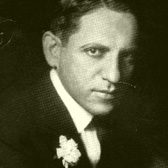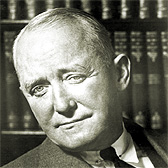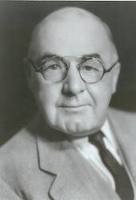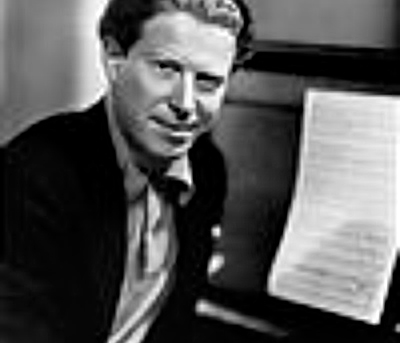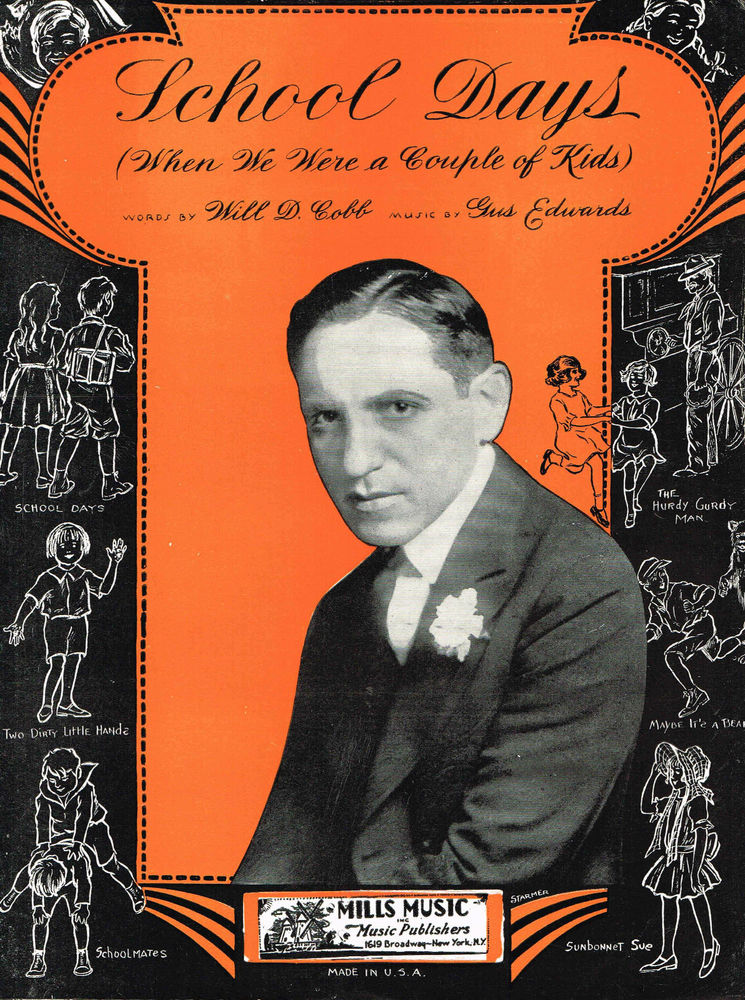Wrote "By the Light of the Silvery Moon" and "School Days"
Known as “The Star Maker” for his discoveries of Groucho Marx, Walter Winchell, Eddie Cantor and George Jessel, songwriter and vaudeville legend Gus Edwards was born in Hohensalza, Prussia on August 18, 1879. When he was 7 years old, his family immigrated to New York and settled in the Williamsburg section of Brooklyn where they opened a family cigar store. As a child, Edwards worked in the family store and attended public schools until he found work as a singer in various lodge halls, ferry boat lounges, saloons and athletic clubs. Eventually, Edward was hired as a song plugger at Koster and Bial’s and later at the Bowery Theater while concurrently performing in several variety shows.
In 1896, vaudeville agent, James Hyde saw Edwards’ performance at the Johnny Palmer’s Gaiety Saloon. Soon after, Hyde formed a variety quintet with Edwards and four other boys. The new act was called the Newsboys Quintet and immediately they were booked on a nation-wide tour. While on tour in 1898, Edwards wrote his first song “All I Want is My Black Baby Back” (popularized by May Irwin).
While the act was entertaining solders at Camp Black during the Spanish-American War (1898), Edwards met a lyricist named Will Cobb. The two began collaborating on new songs and that collaboration lasted for two decades.
In 1905, Edwards formed his own publishing company in New York and began work on his own vaudeville revue entitled School Boys and Girls, which opened in 1907. The act was so successful that it ran for over twenty years. Edwards toured the country in search of new young talent to star in his revue. Some of Edwards’ discoveries included Groucho Marx, Eddie Cantor, Walter Winchell, Mae Murray, Elsie Janis, Sally Rand, Jack Pearl, Ray Bolger, Paul Haakon, Ina Ray Hutton Lila Lee, Eddie Buzzell, George Jessel, the Duncan Sisters and George Price. Edwards introduced so many stars that he became known as The Star Maker in the entertainment industry.
The revue featured music written by Gus Edwards’ in the early years, mainly with Will Cobb. One of Edwards’ biggest hits was the revues featured song “School Days (When We Were a Couple of Kids),” which sold three million copies of sheet music after its introduction in 1907. It’s catchy chorus (“ring around the rosie, pocket full posies”) made “School Days” one of the most recorded songs in the pre-Rock n' Roll era.
Other Edwards-Cobb hits include “Sunbonnet Sue”, “I Just Can’t Make My Eyes Behave”, “The Singer and the Song”, “I Couldn’t Stand to See My Baby Lose,” “I’ll Be With You When the Roses Bloom Again”, “Way Down Yonder in the Cornfield”, “In Zanzibar”, “If I Was a Millionaire”, “Could You be True to Eyes of Blues” and “I Can’t Tell You Why I Love You, But I Do.”
Edwards also collaborated with Edward Madden (“By the Light of the Silvery Moon,” and “Jimmy Valentine”) and Vincent Bryan (“Tammany”, “In My Merry Oldsmobile”, “He’s My Pal”).
While writing, directing, producing and starring in School Boys and Girls, Edwards also wrote the score for Florenz Ziegfeld’s first Folliesshow as well as the score for the Weber-Fields show Hip, Hip, Hooray. He was also a charter member of the new performing rights society, ASCAP (American Society of Composers, Authors and Publishers) in 1914.
In 1928, Edwards moved to Hollywood to work with films. He wrote scores to films with Joe Goodwin, most notably “Orange Blossom Time” and appeared in The Songwriter’s Revue and The Doll Shop. However, in 1930, he retired from the film industry and returned to the vaudeville circuit where he would continue to write and introduce his own songs on stage.
Edwards retired in 1939, the same year Paramount Pictures released a biographical musical film of Edwards’ Life. The film starred Bing Crosby and was titled The Star Maker.
Gus Edwards died in Los Angeles, California on November 7, 1945.
Scroll to Discover Gus Edwards Connections
